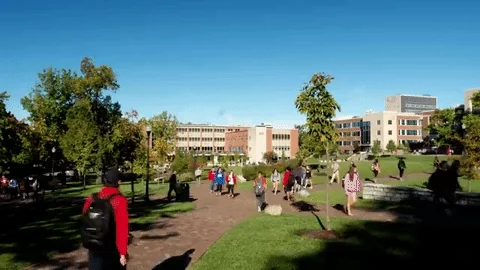Ready for the Next Level?
After graduating from college, you have many options, including grad school. While grad school may seem similar to undergrad, there are significant differences.
Depending on your level of commitment, undergraduate and graduate studies have different outcomes.
— Pacific College
Knowing these differences can make the transition much smoother.

1. Differences Between Graduate & Undergraduate Studies
What's new?
Graduate school can be more challenging than undergraduate because it dives deeper into specific subjects. This can feel like a lot to handle at first. During my first semester, I had trouble keeping up with all the research projects and the amount of detail needed for each one.
These points will help you understand what to expect and how to prepare for the next step.

Undergraduate School
Class sizes: Often large.
Class times: Typically in the morning and afternoon.
Focus: General education, more independent learning and group work.
Duration: Usually 4 to 6 years.
Learning style: Emphasis on broad knowledge, with a mix of individual and group projects.
Professional environment: Professors view you as a student.
Graduate School
Class sizes: Smaller.
Class Times: Often in the evening (e.g., 4:30 PM to 10 PM).
Focus: Specialize in your chosen field (e.g., child development) with no general requirements.
Learning style: More personalized attention from professors, more group-focused and discussion-based.
Professional environment: Professors view you as a fellow professional, not just a student.
Knowledge Check
Imagine it's your first day in a Master's program. You're deciding what actions to take to succeed as a new graduate student:
A. Work closely with professors on research projects.
B. Attend specialized seminars or courses focused on your field.
C. Complete general education requirements (e.g., history, math).
D. Rely on teachers for daily homework reminders.
Quiz
Which of these actions are you most likely to take in your graduate studies? Select all that apply:
2. Challanges
Preparing for Graduate School
With fewer structured classes and more emphasis on self-directed learning, it’s easy to feel overwhelmed.
According to Pew Research:
Only 62% of students who start a degree or certificate program finish their program within six years.

I underestimated how much time reading and research would require, assuming it would be similar to undergrad. Instead of focusing on time, I realized that setting clear goals and breaking tasks into smaller steps was essential.
This approach allowed me to stay organized, focus on important tasks, and manage the workload more effectively, making the transition smoother without stressing over schedules.
3. Time Management
Time management is crucial in grad school, especially with fewer structured classes. I remember underestimating the time needed for readings and assignments. I quickly learned that setting specific goals and breaking tasks into smaller steps helped me stay on track.
One strategy that worked well was dedicating certain hours of the day to specific tasks like research or writing, ensuring steady progress without feeling overwhelmed. This approach kept me organized and productive throughout my studies.

Grad school is filled with reading and research. Learning to prioritize reading and research time can help.
Reading
Create a reading schedule: Break assignments into sections and set specific days to read each part.
Set daily goals: Aim to read a certain number of pages or articles each day.
Prioritize tasks: Focus on readings or research with upcoming deadlines first.
Use a timer: Set 25 minutes of focused work, followed by a 5-minute break.
Research
Set a research timeline: Create a timeline with deadlines for each stage of your research, from gathering sources to writing.
Break it down: Divide your research into manageable tasks, such as finding sources, reading, and summarizing.
Schedule research blocks: Dedicate specific blocks of time for research, ensuring you have uninterrupted focus.
Quiz
When and how should you prioritize readings?
4. Financial Considerations
Graduate school can be financially challenging, and many students don’t see it coming. When I started my master’s degree, I realized that tuition was just the beginning. I also had to pay for textbooks, materials, and living expenses. This financial pressure can be overwhelming, especially when balancing school and other life responsibilities.

Ways to Lower Graduate Costs
Seek financial counseling: Visit your school’s financial aid office for advice on managing costs and finding resources.
Apply for scholarships: Research and apply for scholarships specific to your field of study or offered by your school.
Use work-study programs: Participate in work-study programs that allow you to earn money while studying.
Buy or rent used textbooks: Purchase used textbooks or rent them to save money compared to buying new ones.
Ways to Lower Living Cost
School healthcare: Look at health options offered by your school most offer discounts or low cost care.
School transportation: Look for student discounts on public transit or carpooling options the school offers.
Groceries: Most schools offer meal plans and weekly groceries for students, check out your school's food pantry.
Housing costs: Research affordable housing options through the school. Often, they offer programs exclusive to students with fixed prices.
Quiz
What is a good first step to manage your financial challenges in graduate school?
Take Action

Moving from undergrad to grad school comes with big changes, like smaller classes, more specialized subjects, and higher costs. To help with this transition, it's important to manage your time well and understand your money options.
By preparing ahead, you’ll be ready for the challenges and opportunities that grad school brings!
Your feedback matters to us.
This Byte helped me better understand the topic.
